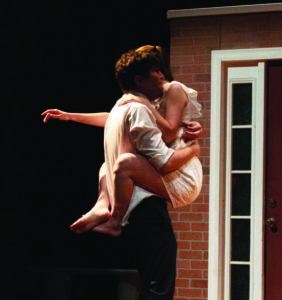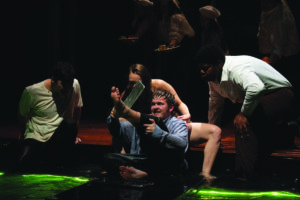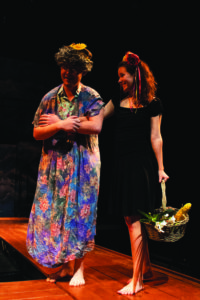Metamorphoses: a unique experience

Metamorphoses, produced by the Maryville College Theatre Department, was an ambitious piece from production to performance. The department constructed a pool for the Haslam Flexible Theatre that became the stage for this rendition of the 1996 play written by Mary Zimmerman.
Following the stories of Homer’s Ovid, Metamorphoses created opportunities for the talent of Maryville college students, alumni, and community members to showcase their abilities.
The first story was that of Midas, senior Lenny Lively, who, dressed as a 1920’s businessman, monologues while waving a cigar. The fast-talking, money-hungry king who yells at his playful daughter, freshman Lilly Potter, in between his monologue about what’s really important, family.
Lively’s comedic, egocentric Midas turns his daughter into gold after being granted the power, at his request, by Bacchus as a favor for taking care of one of his followers, the drunk party boy, Silenus, Caston Weeks. Midas is devastated, and Lively’s ability to turn from a giddy, greedy old-fashioned banker, to a man who has realized he’s ruined his own life a half-second too late, breaks the heart of the audience. Paired with Potter’s unbelievably frozen posture, with a single arm outstretched as Lively carries her around the pool, sets the bar for the rest of the show.
The story of Midas, deemed too sad by one of the Narrators played by sophomore Riley Hamant, is followed by Alcyone, NYU graduate Julianna Sanderson, and Ceyx, Maryville alumni Matt Lyscas. Alceyone begs Ceyx not to go to sea, which he ignores. Ceyx accompanied by sailors played by the ensemble, set sail on stage when Poseidon and his minions enter the scene.
The two groups engage in a stage fight excellently choreographed in the pool. The violence, while shocking and highly stimulating, was well timed allowing the audience to take in the action of the scene.

The actors were able to move freely even within the limited space, and their level of comfort in the water was astounding. The choreography made each individual battle visible, so you could root for Cyex, and be heartbroken as each member of his crew was carried off stage until he was alone in the sea left with only Poseidon, crying out “Alceyone.”
Cyex’s death and Alceyone’s vigil are tender moments captured by both Lyscus and Sanderson.
However, the scene following, when Iris, senior Anna Dieter at the insistence of Aphrodite, Maryville College alumni Caitlin Clark, goes to visit Sleep, freshman Joshua Woods, changes the mood.
Dressed in plaid onesie pajamas, Sleep, attempts to act as a comedic relief to the death of Cyex. This relief, seems tone deaf in comparison the tragedy that seems to have befallen the two lovers. The scene with Sleep seems clunky and forced in the middle of the drama.
The dynamic performance by Caitlin Clark is an impressive thread throughout the production. Playing the snarky, compassionate, but also quick to anger Aphrodite, hissing and twisting Hunger, and the beautiful bride of Orpheus, Eurydice. Her ability to transform from one dynamic character, each being unrecognizable from the last, allows the audience to remain immersed in her captivating performance.
Not all multiple role casting choices were so successful. Lively and Potter return to the stage as Myrrha and her father Cynras who she carries an unnatural lust for after being cursed for ignoring Aphrodite. While Lively and Potter again deliver intriguing performances, with Potter becoming manic before succumbing to her desires, and Lively’s intense and violent reaction to his discovery of what they’ve done, the story of Midas that bookends the show now feels uncomfortable.

The two are so easily recognizable after costume changes that it is difficult to separate the two scenes, especially when one is so shocking to the audience.
The show’s outstanding technical feats are enough to merit the extra show added to accommodate the desire of student and community members who were unable to see the show with the original schedule.
The water allowed for an experience for both actor and audience that does not come often. The show, as an experiment in human emotion and theatrical limits, is an accomplishment for the Maryville College Theatre department that was recognized by those who witnessed it.

